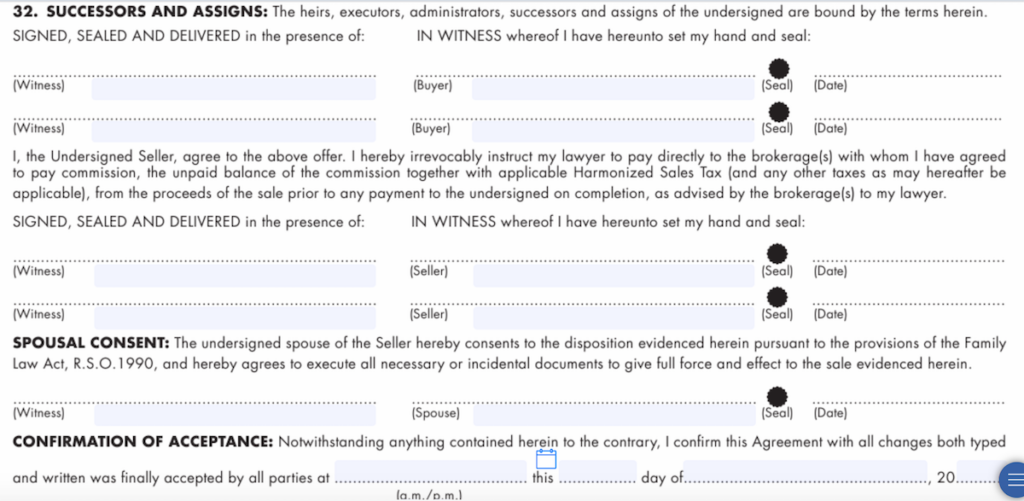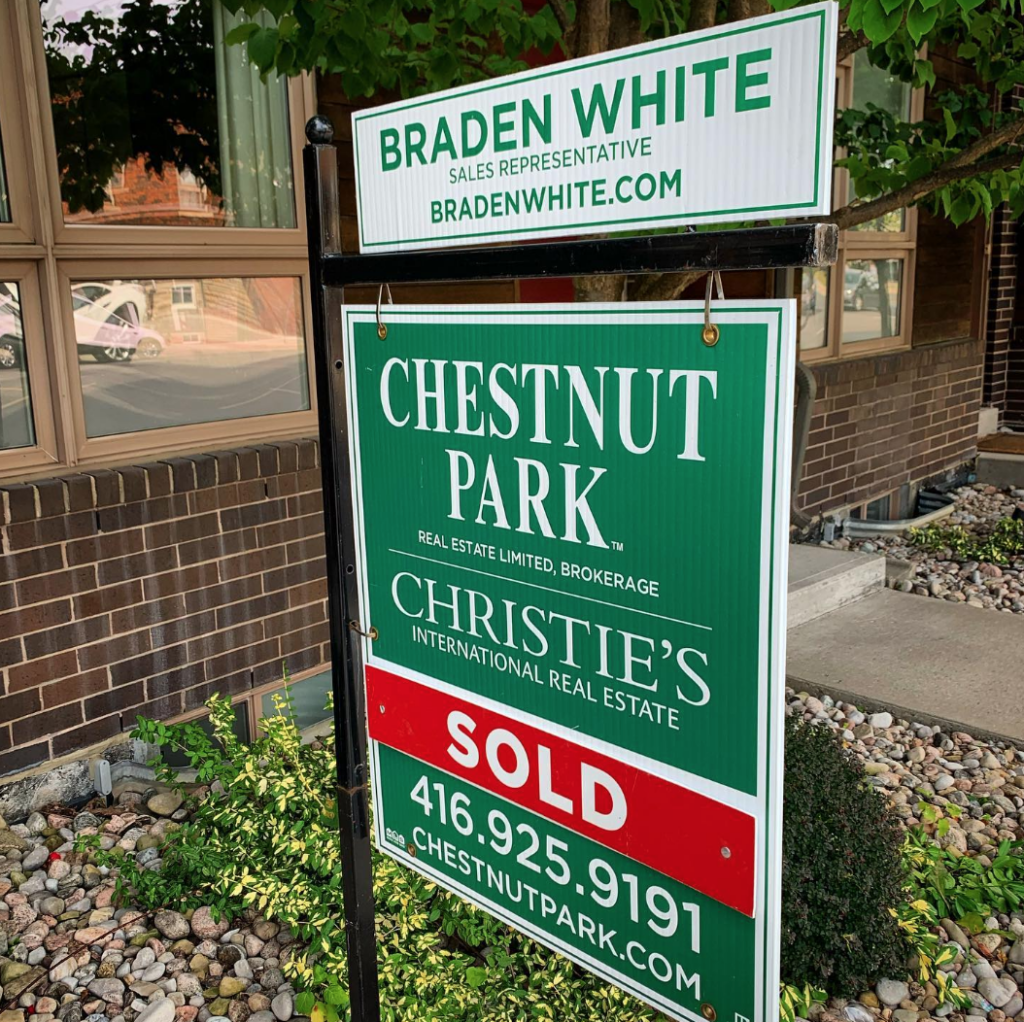
“Should I get pre-approved for a mortgage?”
This is a common question that buyers often ask themselves, particularly if they are new to buying real estate in Toronto.
If you’ve been considering purchasing your first property or you are looking to make a move to a larger home, you may have wondered if you should get pre-approved for a mortgage. If you’re not familiar with lending terminology, you may even wonder what getting pre-approved for a mortgage means.
I’ve put together this blog post in order to help answer your questions so you can make the right decisions throughout your buying journey.
First, let’s discuss the difference between getting pre-qualified vs pre-approved by a lender.
What Does Getting Pre-qualified Mean?
The process of getting pre-qualified from a lender is typically a quick process that requires you to provide certain basic information such as your annual income as well as your debts and assets. Once you have provided this information, the lender will be able to provide you with an amount that they would be willing to lend you for the purchase of a home. However, it’s important to understand that the pre-qualified amount provided by the lender is not guaranteed, therefor, you should avoid submitting any offers until you complete the pre-approval process.
If you are simply curious to know how much your mortgage payments may be based on a certain purchase price and aren’t ready to go through the official pre-qualification and pre-approval processes, many of the major banks have online mortgage calculators that will provide you with an approximate figure. These calculators allow you to insert your purchase price, down payment amount, interest rate and amortization period in order to provide you with an approximate mortgage payment. I’ve included links below to most of major bank mortgage calculators below:
TD Canada Mortgage Payment Calculator
Scotiabank Mortgage Payment Calculator
CIBC Mortgage Payment Calculator
RBC Mortgage Payment Calculator
BMO Mortgage Payment Calculator
What Does Getting Pre-Approved Mean?
Getting pre-approved for a mortgage is the next step following the initial step of pre-qualifying and provides you with a more accurate figure than a pre-qualification figure. During the pre-approval process, you will provide supporting documentation relating to your income, debts and assets and will discuss your downpayment and financial limits and specific needs with your lender of choice. Additionally, you will also discuss the different mortgage options available to you such as variable rate mortgages and fixed rate mortgages along with the different terms, amortization period and payment options available. Once you are pre-approved, you will have a better understanding of how much you can afford when shopping for a home. It’s important to keep in mind that your pre-approval is typically valid for a certain period of time which is typically anywhere between 60-120 days.
Tip: Hold off on making any large purchases or applying for new credit such as credit cards or loans prior to getting pre-approved and prior to closing on your new home. Making large purchases such as purchasing a new car or applying for a new credit card will negatively affect the amount you will be approved for by your mortgage lender.
How Long Does It Take To Get Pre-Approved For A Mortgage?
Getting pre-approved for a mortgage can take as little as a couple of hours or as long as a week (sometimes longer) depending on whether you provide your lender with the required documentation and depending on your lenders requirements. Banks typically take longer than other lenders such as independent mortgage brokers due to their strict pre-approval requirements. If you’re in a rush to get pre-approved for a mortgage because you’ve found the home of your dreams, you may want to consider speaking with an independent mortgage broker as they may be able to get an approval faster.
Is There A Fee For Getting Pre-Approved For A Mortgage?
At the time of this blog post, most of major lenders and mortgage brokers do not charge a fee for completing the pre-approval process. However, it is wise to ask your lender if there are any fees associated with getting pre-qualified or pre-approved in order to avoid any surprises.
Hopefully the above information has answered all or most of the questions you may have had about getting pre-approved for a mortgage. If you still have unanswered questions, feel free to contact me or speak with a lender such as your bank or an independent mortgage broker.
Are you thinking about buying or selling or do you have questions about the current real estate market? Contact me any time with your questions. I’m always happy to help.

If you’re thinking about buying or selling real estate in Toronto, it’s important to understand why you should use a local real estate agent and not an agent from out of town (even if it’s your friend, cousin or sister etc).
Lately, I’ve been seeing many agents advertising that they work in various parts of the GTA outside of their own community. For example, one agent I recently came across advertised that they are located in Hamilton but also stated that they work in “Burlington, Mississauga, Hamilton, Toronto and the GTA”. From the east side of the city, I see many agents who are located in the Durham Region advertising that they work in “Whitby, Pickering, Oshawa, Toronto and the GTA”. Anyone who understands geography and real estate markets knows that it’s practically impossible to truly have your finger on the pulse of that many different real estate markets all at once. Just the city of Toronto alone has several micro markets based on different areas and neighbourhoods throughout Toronto.
Real estate markets are changing by the day and so are different important aspects of each community. For example, many of these areas mentioned above have different bylaws, different new development projects taking place, different short-term rental laws, different politics, different cultures and core values amongst the community members as well.
Although I can appreciate that agents want to make as much money as possible, it’s important to remember that a client should receive the best service possible, even if that means referring business to an agent who is more knowledgeable when it comes to a specific neighbourhood and market.
I always scratch my head when I see people using agents from out of town to list their Toronto home or condo or to assist them with buying a home in Toronto. However, I’m never surprised when the “FOR SALE” sign sits in the lawn longer than other listings that are listed by local agents who know the local market better or when I see that the property sold for less than it should have.
To be fair, I strongly believe the same thing when it comes to Toronto agents assisting clients outside of Toronto. An agent from Toronto simply won’t know other GTA markets as well as the local agents from those markets. Which is why you are often better using a local agent from one of these smaller markets.

In order to help you truly understand the benefits of using a local agent, I have provided the following helpful information below as to why you should use a local real estate agent.
They Know The Community Better – A local agent knows your community extremely well and can answer buyers’ questions correctly while also providing additional local insider tips and info about the neighbourhood that outside agents won’t know. Whether it be answering questions about the best schools in your area, the demographics of the neighbourhood, the best coffee shops and restaurants nearby, the closest Go Train or subway station, the local festivals and events, the best dog parks, playgrounds, or simply what makes your neighbourhood the best option for them compared to the other neighbourhoods they are considering. A local real estate agent will be able to address all of these items which most definitely will help sell your home faster and potentially for more money.
They Know The Inside Scoop – local agents are more likely to know the inside scoop on different ideal streets and condo buildings which can be helpful when you are buying. Experienced local agents will be familiar with any issues that may come up in the status certificate of a building that you are considering buying in due to past experience with submitting offers for other clients in that building. There’s also a better chance that they will either have other clients who live in the building or on the same street who can provide valuable insider information that may sway your decision and help you avoid making the wrong decision. Additionally, they will likely be aware of any upcoming construction and or developments that may be coming up in the future which may affect your ability to enjoy your new home or condo.
Avoiding Costly Misrepresentations – As many of the homes in Toronto were built in the 1920’s and even earlier, they are not built the same as cookie-cutter suburban homes found in new-build suburban developments. In addition to them being older, almost every home in Toronto is unique in its own way. Whether it’s the way that it was built, the heating and cooling system within it, the sewer system, the easements on title or the encroachments along the property lines. You will rarely find a home or property without unique attributes and features that need to be taken into consideration when listing a property for sale or buying a property. As a seller, it’s important to understand that any misrepresentation made by your real estate agent can fall back on you which could potentially land you in a legal dilemma that can become both costly and time consuming. By using a local, knowledgable and experienced Toronto real estate agent to sell your Toronto home, you can greatly reduce your chances of running into legal and financial issues when selling.
They Know The Local Market Better – A good local Toronto real estate agent will know the markets and neighbourhoods that they work in extremely well. They will be keeping an eye on their local market on a daily basis and will be watching the market trends such as the average selling price, average days on market, the list-to-sale price ratio etc. They will also have seen most of the properties in the area in person from showing them to other buyer clients in the past. This is invaluable as outside agents will not be viewing comparable homes in person and won’t be able to provide valuable information that could only be discovered in person such as knowing that a comparable home to yours sold for less money because the photos in the listing didn’t include a photo of the moldy bathroom.

They Have Stronger Relationships With Other Local Agents – Local agents talk with one another and are often on the opposite sides of the deal table helping their clients come to an agreement. Due to the ongoing local relationships that agents have with one another, it’s likely that the local agent you are considering hiring versus the outsider agent will likely be up to date with more local information that could affect the sale of your home. Whether it be discussions relating to a new development that will be built down the street in the near future, a large streetcar track renovation that could take months, new zoning bylaws that have just passed etc, a local agent is more likely to be aware of such relevant information that could negatively affect your home’s value. Also, due to their relationships with other local Toronto real estate agents, they will likely be aware of any “exclusive” (off market) listings that may meet your requirements.
They Are More Readily Available In Person – It’s not uncommon for sellers to move out of their homes during the first week of showings in order to avoid the hassle of having to leave all of the time while also having to worry about keeping the home in top showing condition. Should there ever be any issues with the listing during the showing period, your local real estate agent will be able to promptly address the issue whereas an agent from out of the city won’t be able to. As an example, what happens if a buyer’s agent can’t open the lock box, how will this be addressed promptly if your real estate agent needs to drive an hour to get to your home? A local real estate agent will be able to address such a situation in a much shorter period of time. This is just one example of the many things that can go wrong during a listing and just one of the benefits your local agent being close by for emergencies.
Investing Back Into The Local Community – Many real estate agents invest back into their local community in various ways. For example, I sponsor a number of local kid’s soccer teams in my area. I also pay for advertising signs where a portion of the advertising fee that I pay goes towards maintaining the hockey rink in which the local kids learn to skate and play hockey. Additionally, I regularly donate to several important causes such as SickKids Hospital, Princess Margaret Cancer Centre and the Child Development Institute which are all great causes located here in Toronto. By hiring an agent from outside of your area, you won’t be reinvesting back into your community, you will be investing in their community outside of Toronto.
As you can see from the above, there are many reasons why you should use a local real estate agent for your real estate needs.
Are you thinking about buying or selling in Toronto or do you simply have questions about the current market? Contact me any time with your questions or to discuss how I can help you achieve your real estate objectives.

As a full time real estate agent, my seller clients often ask me “what if the buyer doesn’t deliver the deposit?”. This is a great question and if you are wondering the same thing, I’ve included an explanation below.
I completely understand the stress that sellers may feel when waiting for the deposit to be delivered, it’s not an easy time waiting and wondering if the money will arrive. I myself have been in this position in the past when I have sold my previous properties prior to becoming a real estate agent. The process of selling a home can be confusing when you don’t do it on a daily basis.
Although many people think that a deal is automatically dead if the deposit isn’t delivered by the buyer, this isn’t the case. There is often a misconception amongst both buyers and sellers when it comes to what happens if the buyer doesn’t deliver the deposit. Ontario law states that in order for a contract to be valid, the following must be included: an intention to contract, an offer to contract, an acceptance of that offer and consideration.
For those of you who may not be familiar with legal terminology, the term “consideration” applies to the deposit when referring to a real estate transaction. Based on this wording, many would assume that if there is no deposit (consideration), there is no binding deal and that the buyer can simply walk away from the deal without any penalty, but isn’t correct.
The majority of (standard form) offers that are used to sell real estate in Toronto state that the buyer must deliver the deposit within 24 hours of acceptance of the offer. The exact pre-printed wording in the standard form reads as follows:

In most cases, when the buyer doesn’t deliver the certified deposit at the same time they submit their offer, they will typically insert the wording “Upon Acceptance” in the top line. This means they will deliver the deposit to the listing brokerage within 24 hours of the offer being accepted, whether the offer ends up being accepted by the seller or buyer once negotiations are completed and both parties have come to an agreement. The “Upon Acceptance” option tends to be the more common approach versus delivering the deposit with the offer. This is mainly due to buyers avoiding the hassle of taking their deposits back to the bank if their offer isn’t accepted.
So, what if the buyer doesn’t deliver the deposit? Well, the good news for you as a seller is that according to the law the deal isn’t dead. On page 5 of 6 of the offer where all parties to the agreement sign, they sign “under seal”. You are likely wondering what this means. In short, based on Ontario laws, a contract signed under seal is one that is “formal” and one that does not require any consideration (deposit) to make it firm. Below, you can view the section of page 5 of 6 being referred to and can view the black dots with the wording “seal” under them. These black dots indicate that the agreement being signed is being signed under seal and that all parties are bound to the contract with or without consideration.

Now you are probably thinking, this is helpful to know but what happens next if the buyer doesn’t deliver the deposit? Once the buyer hasn’t delivered the deposit within the stated 24 hour period, they are considered to be in breach of the agreement. At this point, the listing brokerage will send the buyer’s agent’s brokerage (co-operating brokerage) a notice informing them that they are in breach and that the seller will continue to market the property at this point. Should the seller continue to market the property and accept another offer that is for less money than the original offer or an offer that requires the seller to take on any other financial losses outside of the sale price, the seller then has the right to sue the original offerer for those losses. For example, if the original offerer submits an offer for $1,500,000 but the seller can only sell for $1,300,000, the seller could then sue the original offerer for the $200K loss as well as the legal fees associated with recovering that loss.
With all of the above being said, suing a buyer can be a time consuming and costly task. If the person doesn’t have the funds to cover your loss, you may find yourself out of pocket thousands of dollars and mentally drained from the amount of time and effort dedicated to going after them.
The best way to avoid running into a situation like this is to request that all offers include a bank draft or certified cheque covering the deposit amount included with the offer at the time of offer presentation. You typically want to receive a deposit of at least 5% of the offer price or more, the higher the better. By doing this, you are ensuring that the person purchasing your property has the funds for the deposit and it is less likely for them to walk from the deal once you are in possession of their deposit. If you have any questions or concerns regarding legal aspects of your real estate deal, it is best to get advice from a local Toronto real estate lawyer as they will be able to provide you with all of your options based on Ontario’s laws.
Are you thinking about buying or selling or do have questions about the current market? Contact me any time with your questions. I’m always happy to help.

If you’ve been following the recent headlines in Canadian real estate news, you may have heard about Canada’s two year ban on foreign buyers. The “Prohibition on the Purchase of Residential Property by Non-Canadians Act” will take effect January 1, 2023 and is to be in place for a minimum of at least two years.
As you may already be aware, major Canadian cities such as Toronto, Vancouver, Montreal and Calgary have seen an influx of real estate being purchased by foreign buyers over the past decade or so.With Toronto, and Canada as a whole, being a desirable place to invest due to our relatively stable economy, growing job opportunities, consistent population growth, low crime rates (when compared to other major international cities) and a lack of supply to keep up with the demand, there is no surprise that many investors choose to invest in Canadian real estate.
Below are some highlights from the new Act in order to help you understand how it will apply to the way real estate is traded here in Toronto.
What Is Considered A “Non-Canadian”?
(a) an individual who is neither a Canadian citizen nor a person registered as an Indian under the Indian Act nor a permanent resident;
(b) a corporation that is incorporated otherwise than under the laws of Canada or a province;
(c) a corporation incorporated under the laws of Canada or a province whose shares are not listed on a stock exchange in Canada for which a designation under section 262 of the Income Tax Act is in effect and that is controlled by a person referred to in paragraph (a) or (b); and
(d) a prescribed person or entity. (non-Canadien)
permanent resident has the same meaning as in subsection 2(1) of the Immigration and Refugee Protection Act. (résident permanent)
What Is Considered A Residential Property Based On The Act?
residential property means any real property or immovable, other than a prescribed real property or immovable, that is situated in Canada and that is
(a) a detached house or similar building, containing not more than three dwelling units, together with that proportion of the appurtenances to the building and the land subjacent or immediately contiguous to the building that is reasonably necessary for its use and enjoyment as a place of residence for individuals;
(b) a part of a building that is a semi-detached house, rowhouse unit, residential condominium unit or other similar premises that is, or is intended to be, a separate parcel or other division of real property or immovable owned, or intended to be owned, apart from any other unit in the building, together with that proportion of any common areas and other appurtenances to the building and the land subjacent or immediately contiguous to the building that is attributable to the house, unit or premises and that is reasonably necessary for its use and enjoyment as a place of residence for individuals; or
(c) any prescribed real property or immovable. (immeuble résidentiel)
Who Is Prohibited From Buying Canadian Real Estate Under The Act?
4 (1) Despite section 34 of the Citizenship Act, it is prohibited for a non-Canadian to purchase, directly or indirectly, any residential property.
Exception — persons
(2) Subsection (1) does not apply to
(a) a temporary resident within the meaning of the Immigration and Refugee Protection Act who satisfies prescribed conditions;
(b) a protected person within the meaning of subsection 95(2) of that Act;
(c) an individual who is a non-Canadian and who purchases residential property in Canada with their spouse or common-law partner if the spouse or common law-partner is a Canadian citizen, person registered as an Indian under the Indian Act, permanent resident or person referred to in paragraph (a) or (b); or
(d) a person of a prescribed class of persons.
Foreign state
(4) For greater certainty, nothing in subsection (1) is to be construed as hindering a foreign state from purchasing residential property for diplomatic or consular purposes.
Non-application
5) Subsection (1) does not apply if the non-Canadian becomes liable or assumes liability under an agreement of purchase and sale of the residential property before the day on which this Act comes into force.
What Are The Penalties For Offences?
6 (1) Every non-Canadian that contravenes section 4 and every person or entity that counsels, induces, aids or abets or attempts to counsel, induce, aid or abet a non-Canadian to purchase, directly or indirectly, any residential property knowing that the non-Canadian is prohibited under this Act from purchasing the residential property is guilty of an offence and liable on summary conviction to a fine of not more than $10,000.
Party to offence
(2) If a corporation or entity commits an offence, any of the following persons that directed, authorized, assented to, acquiesced in or participated in the commission of the offence is a party to and liable for the offence whether or not the corporation or entity has been prosecuted or convicted:
(a) an officer, director or agent or mandatary of the corporation or entity;
(b) a senior official of the corporation or entity;
(c) any individual authorized to exercise managerial or supervisory functions on behalf of the corporation or entity.
Although this new two year ban on foreign buyers appears to have good intentions for Canadians, this Act would have been more beneficial to Canadians back in 2016 when we were seeing an influx of foreign investment and offer amounts substantially higher than the list prices due to lower interest rates.
If you are a foreign investor considering buying a property here in Toronto, it is important to review the full Act and discuss your options with a local Canadian real estate lawyer before moving forward with submitting an offer on a property.
Are you thinking about making a move or have questions about the current real estate market? Contact me any time with your questions. I’m always happy to help.

When it comes to paying taxes, Canadians are used to footing the bill for income tax. But what about capital gains tax? When do you have to pay capital gains tax? This unique tax is applied to profits made from the sale of certain assets, such as stocks and real estate. While the rate of capital gains tax varies depending on the province in which you live, it is generally lower than your marginal income tax rate.
What Is Capital Gains Tax?
When you buy a property and later sell it for more than you paid, the difference is your “capital gain.” If the sale price is less than what you paid, the difference is a “capital loss.” Keep records of all improvements you make to the property so that you can add their cost to your “base cost” (what you paid plus the cost of these improvements), this will help to reduce your capital gain.
You pay tax on half your capital gain. So, if your capital gain is $50,000, for example, you include $25,000 in your income for tax purposes. The taxes you pay on a capital gain are usually lower than the taxes you pay on other types of income.
In order to calculate the capital gain, you must first determine the “taxable gain.” The taxable gain is equal to the sale price of the property minus the “adjusted cost base” of the property. The adjusted cost base is generally equal to the purchase price of the property, plus any improvements that have been made to the property, minus any depreciation that has been claimed.
If you are selling your principal residence (i.e. your home) and you lived in your home each year that you owned it, you will likely be eligible for a Capital Gains Tax exemption.

What Are Some Situation When You May Need To Pay Capital Gains Tax?
There are a number of situations where you may be required to pay capital gains tax in Canada. If you sell a property that is not your primary residence, you will typically be subject to capital gains tax. Similarly, if you sell shares of a company or other investments, you may also be required to pay capital gains tax. Capital gains tax is calculated based on the difference between the purchase price and the sale price of the asset. The rate of tax depends on a number of factors, including your marginal tax rate and the particular tax laws in the province which you own the property in. In some cases you may be able to make qualify for the principal home exemption. For example, if you sell your home and purchase a new one, you may be eligible for the exemption. However, there are restrictions and conditions that must be met in order for the exemption to apply.

What Is A Principal Residence?
As of the time of this blog post, the Canadian Government states that the following criteria are required in order for a property to “qualify” as a principal residence:
As you can see from the above information, if you are considering investing in Toronto real estate, it is important to take capital gains tax into consideration when forecasting your return on investment. It is also important to keep in mind that you will likely be required to pay capital gains tax if you should decide to sell your principal residence and transition to renting a property. It’s important that you speak with your accountant or your real estate lawyer to see if you will be exempt from having to pay capital gains on the sale of your property.
Are you thinking of making a move or have questions about the Toronto real estate market? Contact me any time, I’m always happy to help.

As someone who lives in The Beaches and as an agent who works in the community, my clients often ask for suggestions regarding different restaurants in The Beaches, especially if they are new to the area.
One of the things I love the most about living and working in this part of the city is the fact that it doesn’t feel like you are in the city and it has the vibe of a small town even though it’s quite a large area geographically speaking. One of the best features this community has to offer are the many different restaurants that provide a wide range of food options to local residents and visitors.
I’ve put together this directory of Beaches restaurants in hopes of making your search for your next meal that much easier. Although this list may not include every single restaurant in The Beaches, it does include many of the prominent restaurants in the area. Feel free to send me a message if you think of a restaurant that isn’t on the list which you feel should be added.

Restaurants In The Beaches
The Beacher Cafe
2162 Queen Street E
Toronto, ON
416-699-3874
Slate Restaurant & Bar (Italian Food)
2237 Queen Street E
Toronto, ON
416-686-0800
Mamma’s Pizza (Italian Food / Pizza)
2118 Queen Street E
Toronto, ON
416-690-0707
6ix Pizzas (Italian Food / Pizza)
2070 Queens Street E
Toronto, ON
416-551-4894
The Hideout On The Beach (Pub Food)
2282 Queen Street E
Toronto, ON
416-693-2727
Bagels On Fire (Bagels)
2248 Queen Street E
Toronto, ON
647-343-8484
The Haven Low-Carb Cafe (Low-Carb, Gluten Free Food & Coffee)
2256 Queen Street E
Toronto, ON
416-698-2265
Remarkable Bean (Coffee Shop & Cafe)
2242 Queen Street E
Toronto, ON
416-690-2420
Oro Cafe & Eatery (Coffee Shop & Cafe)
2377 Queen Street East
Toronto, ON
416-690-6555
Tori’s Bakeshop (Coffee & Cafe)
2188 Queen Street E
Toronto, ON
647-350-6500
Bud’s Coffee (Coffee & Cafe)
1966 Queen Street E
Toronto, ON
416-699-9410
Sauvignon Bistro & Bakery (Coffee & Cafe)
1862 Queen Street E
Toronto, ON
416-686-1998
Juice & Java Cafe (Juices, Coffee & Cafe)
2102 Queen Street East
Toronto, ON
416-913-9977
Gong Cha (Bubble Tea)
1918a Queen Street E
Toronto, ON
416-686-1005
Starbucks (Coffee & Cafe)
1960 Queen Street E
Toronto, ON
416-690-0731
Tim Hortons (Coffee & Cafe)
2002 Queen Street E
Toronto, ON
416-694-8393
Zane Patisserie (Coffee & Cafe)
1842 Queen Street E
Toronto, ON
416-690-2813
Isabella’s Mochi Donut Boutique (Cafe / Japanese Style Donuts)
2066 Queen Street E
Toronto, ON
416-699-5050
Freshii (Healthy Food Options)
2032 Queen Street E
Toronto, ON
647-812-3601
Sunset Grill (Breakfast Food)
2006 Queen Street E
Toronto, ON
416-690-9985
Beaches Brewing Company (Beer & Pub Food)
1953 Queen Street E
Toronto, ON
647-492-3224
The Stone Lion (Pub Food)
1958 Queen Street E
Toronto, ON
416-690-1984
Breakwall BBQ & Smokehouse (Pub Food)
1910 Queen Street E
Toronto, ON
416-699-4000
The Gull And Firkin (Pub Food)
1943 Queen Street E
Toronto, ON
416-693-9337
Outrigger (Casual, American Food)
2232 Queen Street E
Toronto, ON
647-748-2232
Gabby’s (Pub Food)
2076 Queen Street E
Toronto, ON
416-699-5699
Ed’s Real Scoop (Ice Cream Shop)
2224 Queen Street E
Toronto, ON
416-699-6100
La Diperie Beaches (Ice Cream Shop)
2196 Queen Street E
Toronto, ON
416-567-3226
Xola (Mexican Food)
2222A Queen Street E
Toronto, ON
647-827-9070
Kyouka Ramen (Japanese Food)
222 Queen Street E
Toronto, ON
647-748-6288
Delhi Bistro (Indian Food)
2214 Queen Street E
Toronto, ON
647-351-6112
955 Chinese Food (Chinese Food)
2252 Queen Street E
Toronto, ON
647-354-3818
The Goof! Garden Gate Restaurant (Chinese & American Fare)
2379 Queen Street E
Toronto, ON
416-694-9696
Genji Sushi (Sushi)
2250 Queen Street E
Toronto, ON
416-699-9335
Yumei Sushi (Japanese Food)
2116 Queen Street E
Toronto, ON
416-698-7705
Hajime Japanese Restaurant (Japanese Food)
2209 Queen Street E
Toronto, ON
416-690-5959
Bikkuri Japanese (Japanese Food)
2197 Queen Street E
Toronto, ON
416-693-5775
Torisho (Japanese Food)
1940 Queen Street E
Toronto, ON
416-255-3584
Green Basil (Thai Food)
2120 Queen Street E
Toronto, ON
416-698-2120
Thai House Cuisine (Thai Food)
2213 Queen Street E
Toronto, ON
416-686-8541
Inmigrante (Latin Food)
1959 Queen Street E
Toronto, ON
647-628-8180
Swiss Chalet (Rotisserie Chicken)
2148 Queen Street E
Toronto, ON
416-693-2881
Subway (Sandwiches)
2229 Queen Street E
Toronto, ON
647-436-1105
The Souvlaki Hut (Greek Food)
2100 Queen Street E
Toronto, ON
416-690-1927
The Nutty Chocolatier (Chocolate & Sweets)
2179 Queen Street E
Toronto, ON
416-698-5548
Green Eggplant (Mediterranean Food)
2024 Queen Street E
Toronto, ON
416-913-3361
Delina Restaurant (Mediterranean Food)
1891 Queen Street E
Toronto, ON
647-348-2009
Toronto Beach Club (Mediterranean Food)
1681 Lake Shore Blvd E
Toronto, ON
416-694-8844
Friends Burgers (Burgers)
1922 Queen Street E
Toronto, ON
416-691-4545
Hero Burgers (Burgers)
2018 Queen Street E
Toronto, ON
647-748-7977
Fat Bastard Burrito (Burritos & Mexican Food)
2008 Queen Street E
Toronto, ON
416-551-3338
Tiflisi Restaurant (Georgian Food)
1970 Queen Street E
Toronto, ON
416-686-7389
Are you thinking about buying or selling in The Beaches or do you have questions about the market? Contact me any time with your questions or to discuss how I can help you achieve your specific real estate objectives.

If you’ve come across this blog post you’re likely either looking to hire “the best Toronto real estate agent”, you’re just curious to know who the best Toronto real estate agent is or you’re a real estate agent checking to see if Google has you listed as “the best Toronto real estate agent”. Regardless of reason, you’ve ended up here.
So, who is the best Toronto real estate agent?
That’s a great question and although many people will throw around certain “luxury agent” names during conversations, it’s hard to specifically define what “The best Toronto real estate agent” means or who they are. Are we talking about an agent who sells the highest volume of properties each year, an agent who sells very few properties but the ones they do sell are in the multi-million dollar price range, an agent who sells few properties but each one they list sells for record breaking numbers, are we talking about the agent that provides their clients with the absolute best level of service each and every time no matter what the price point is, is it the most honest agent, the one with the highest education, the one who is a part of elite social circles, the one with the most brokerage awards, the most Instagram followers or the most Google reviews?
“The best Toronto real estate agent” is quite a subjective term that will mean something different to everyone depending on what they value and what they are looking for in an agent.
As a full-time Toronto real estate agent who works with both sellers and buyers, I have had my fair share of experiences with working along side and opposite of agents on the other side of the deal table. I’ve had the opportunity to work with and opposite of “high end”, “low end”, experienced, new agents and everything in between, and what I have learned over the years is that Toronto real estate agents come in all different shapes and sizes, with different skills, backgrounds and personalities. Some are good and some are not so good, just like any other industry.
There are many great agents out there and when it comes to selecting the “best Toronto real estate agent” for your specific real estate objectives, it’s important to consider your specific needs and expectations. It’s essential that you consider what is important to you, what do you need from an agent to succeed at achieving your specific real estate goals. The agent who sells multi-million dollar homes may not be the right one for you if your home’s value is closer to the average Toronto home price. Conversely, if you’re looking to sell your $15M home in the Bridle Path, an agent who specializes in selling condos for $500k is probably not the one for you either. These are just a couple of examples as to why the Google results for “the best Toronto real estate agent” may not be the right ones for you to make your decision, depending on what you specifically need and value.
Your search inquiry to Google shouldn’t be “who is the best Toronto real estate agent?” when looking to hire a real estate agent, the right question you should be asking yourself is “who is the best Toronto real estate agent for me?”. Who is going to provide you with the best results, the best customer service based on your home type, budget and specific needs and expectations. Who will you relate to the most and and enjoy working with and who will empower you as a seller or buyer by providing you with valuable information before, during and after the buying or selling process. Do you want to work with a real estate team and potentially get passed around amongst the team’s junior and less experienced agents or do you prefer to work with an experienced individual agent who will provide you with more one on one and personalized service. These are just some of the things you should be taking into consideration.
Whether it’s real estate, sports, fashion or otherwise, many people want to be associated with whomever is currently perceived as number one, but in real estate, the reality is that the perceived best Toronto real estate agent may not be the right one for you and your specific needs and values will determine who is actually the best fit for you and your real estate objectives.
Are you thinking about buying or selling or do you have questions about the current market? Contact me any time. I’m always happy to help.

Whether you are looking to buy a home or sell your home in Toronto, you may have wondered “what is a 3D virtual tour?”. Although this technology isn’t new, it has become extremely popular over the last several years due to the pandemic restrictions that took place. The industry leader responsible for providing this technology is Matterport.
What Is A 3D Virtual Tour
Matterport has created a web-based platform that allows users to create 3D virtual twins of any space with the use of their 3D cameras. Once the photos have been taken, the system then creates a 3D twin of the space which viewers can then walk through virtually by toggling throughout the space. Below is a short video explanation with some examples.
When it comes to buying or selling a home, there are a lot of important decisions that need to be made. One of the most crucial decisions is whether or not you should rely on a virtual home tour for either buying a home or selling your home. Below are some things you should consider before making your decision.
The Advantages Of Virtual Home Tours
The Disadvantages Of Virtual Home Tours
Overall, 3D virtual home tours are a great option for anyone who is buying or selling a home. They are convenient, offer a realistic view of the property, and can be edited to your liking. Just keep in mind that they may not be as reliable or informative as in-person tours. For that reason, when buying, I’m a firm believer that you should always view the property in person.
Hopefully the above has answered any questions you may have about what a 3D virtual tour is.
Are you thinking about making a move or have questions about the current market? Contact me any time, I’m always happy to help.

Divorce and selling your home can be two very emotional and overwhelming experiences, but with the right help, you can avoid costly mistakes in order to make the process as stress-free as possible. As a Toronto real estate agent who has assisted clients with selling their homes due to divorce, I understand how stressful the process can be for everyone involved. I have put together this article to help answer any questions you may have about the process of selling your home due to divorce.
In this article, we’ll summarize what qualifies as a matrimonial home, the rights relating to the matrimonial home for each spouse during separation, the process of selling a house in Toronto along with guidance on how to make the sale as smooth and successful as possible.
What Is A Matrimonial Home?
It’s important to understand what defines a matrimonial home here in Toronto.
Section 18(1) of the Family Law Act defines a matrimonial home as any property which either spouse has an interest and is currently, or was at the time of separation, ordinarily occupied by the person and his or her spouse as their family residence.
There are no restrictions in regards to what type of property qualifies as a matrimonial home here in Toronto and throughout Ontario. Whether it is a condo in the city, a cottage in cottage country or a mobile home, there are no restrictions so long as the property is owned by one or both spouses and the property is “ordinarily occupied” by the spouses at the time of separation.
A common misconception relating to the matrimonial home is that there can only be one matrimonial home which is incorrect. In Ontario, spouses can have more than one matrimonial home. Make sure you speak to a reputable real estate lawyer to understand the designation of each property you own prior to listing any of your properties for sale.

Your Rights
There are three options when it comes to the what can be done with the matrimonial home during a divorce:
The second and third option would likely require the opinion of both an appraiser and a reputable real estate agent in order to determine what would be fair market value for the home. However, it is important to understand the risks associated with this option. The best way to determine a properties true market value is always by listing it on the open market as buyers will ultimately decide how much your home is worth. Additionally, depending on the market at the time that you list, there is always the potential for a bidding war which could substantially increase the final sale price of the home. This is just something to consider and to discuss with a real estate agent prior to agreeing buy out your spouse.
Your rights during the separation process:
It’s important that you speak with a lawyer who specializes in family law and who knows the Family Law Act to understand all of your rights, before, during and after the separation.

Selling Your Home
When selling your home due to divorce, it is crucial that both spouses work together as much as possible in order to achieve the best possible price for the home. It is in the best interest of both spouses to work together during this time as both will be splitting any profit derived from the sale of the property. Below is a list of just some of the items and situations where both parties will need to come to an agreement before and during the listing process.
It is also important to take into consideration all of the costs associated with selling your matrimonial home when forecasting any potential split of equity from the sale. Below is a list of the larger costs to consider.
Divorce and selling your home can be an incredibly difficult and emotional time, but it doesn’t have to cause too much disruption in your life. Selling a house in Toronto due to divorce may seem like an overwhelming task, but if you take the right steps, you can make the process as stress-free as possible. Speak with a family lawyer, take the time to go over your finances and consider getting help from a local reputable real estate agent. By taking these steps and understanding the process of selling a home due to divorce, you can ensure that you are making the best decision for both parties involved.
Do you have questions about selling, buying or about the market in general or do you need a referral to a family lawyer? Contact me any time with your questions or to discuss how I can help you achieve your specific real estate objectives.
